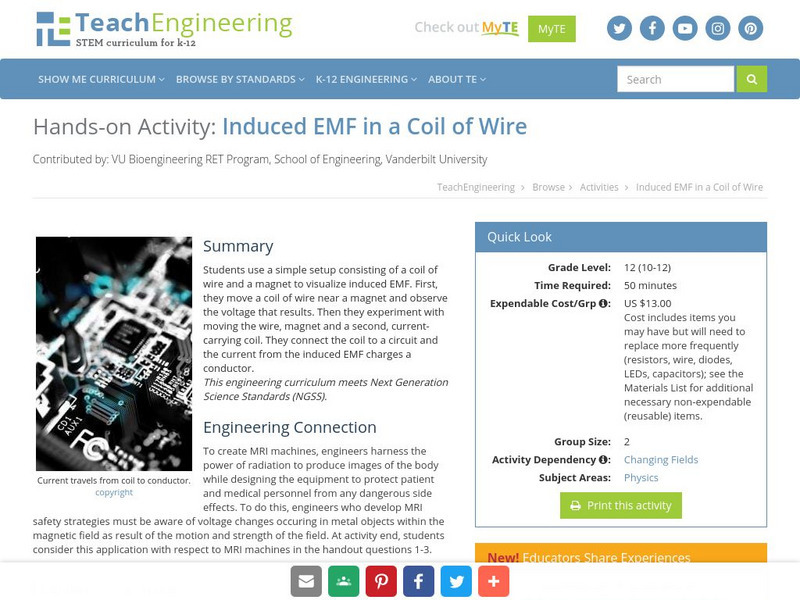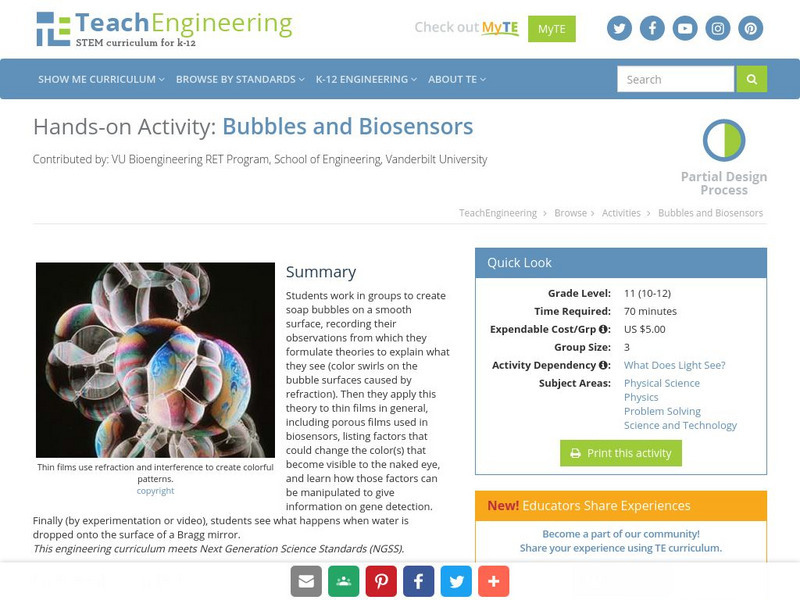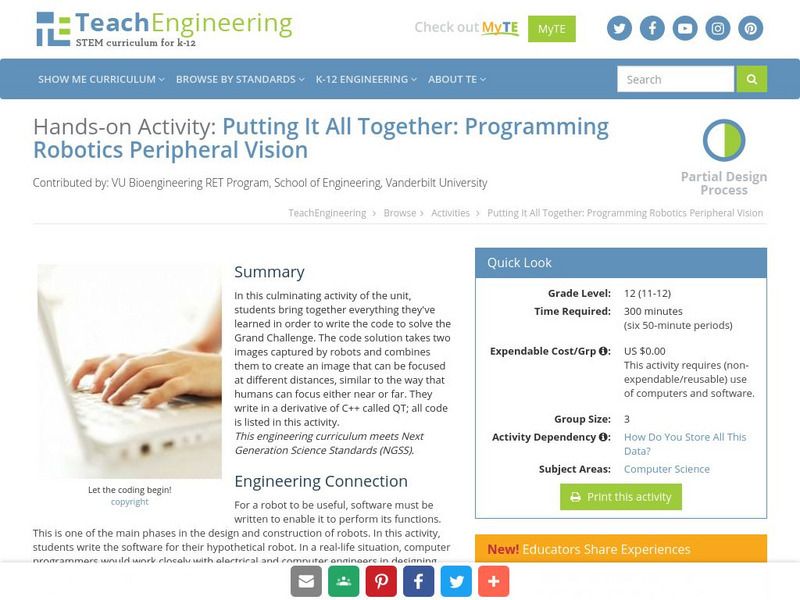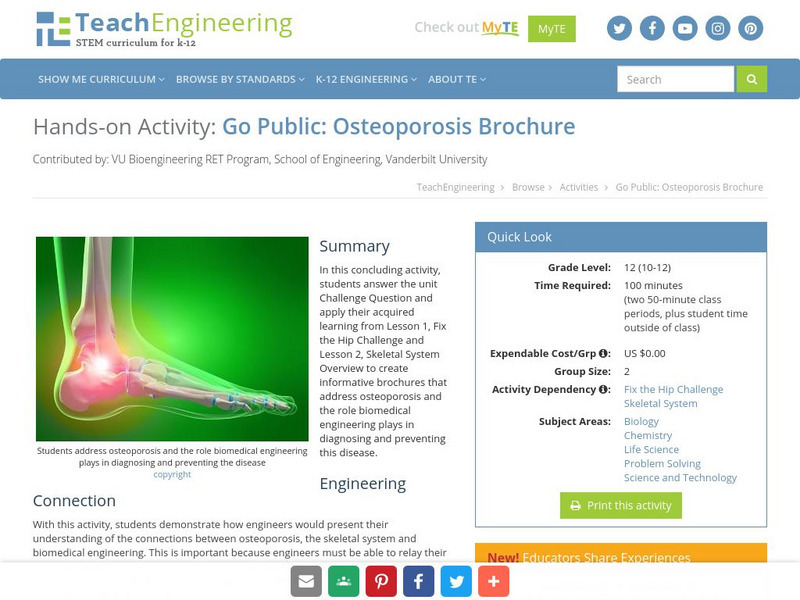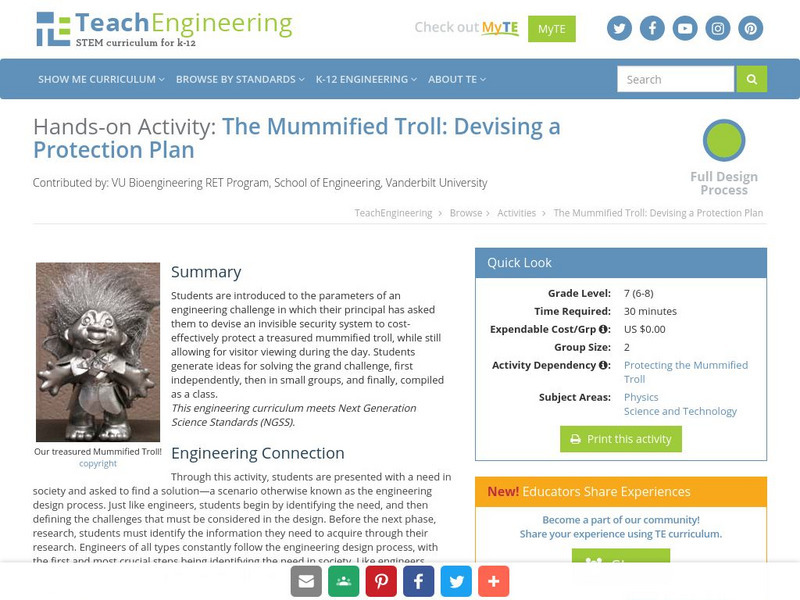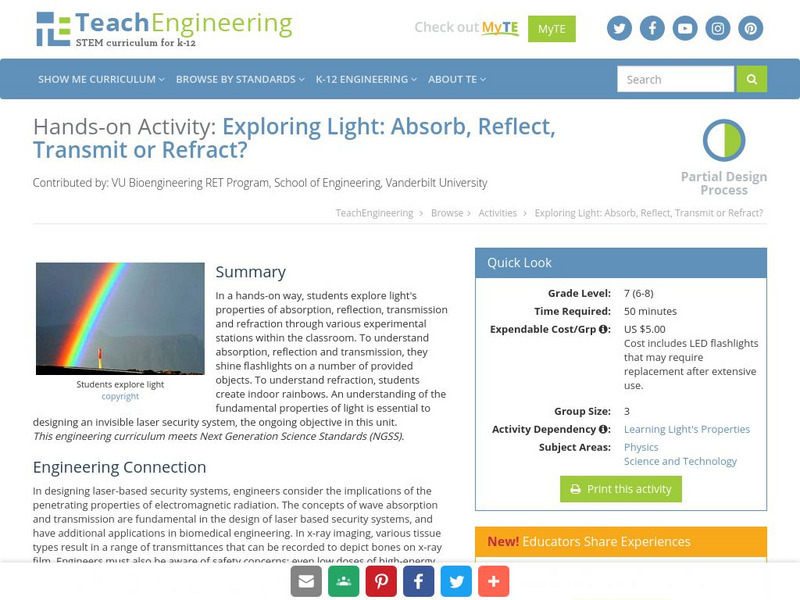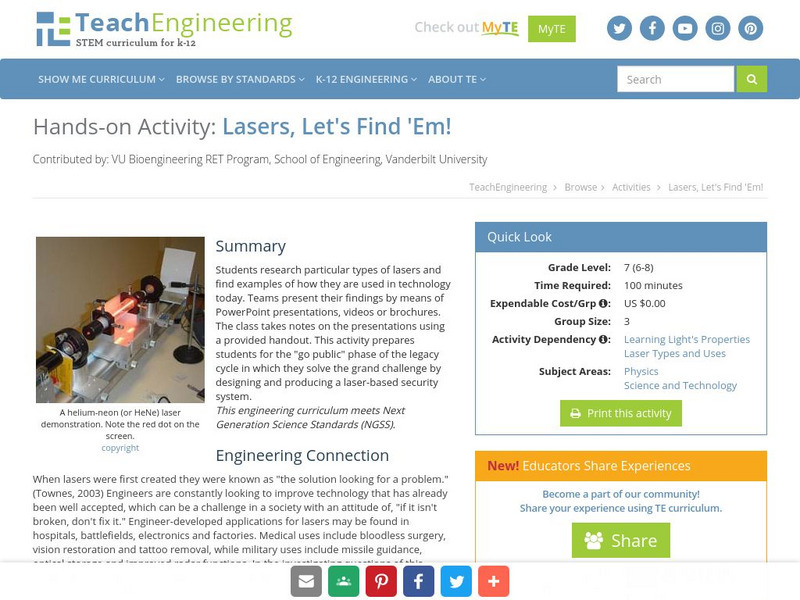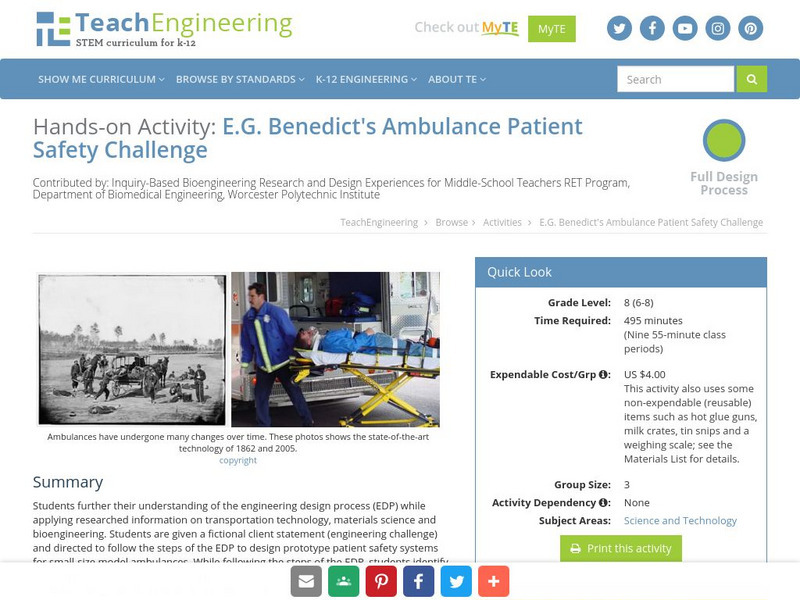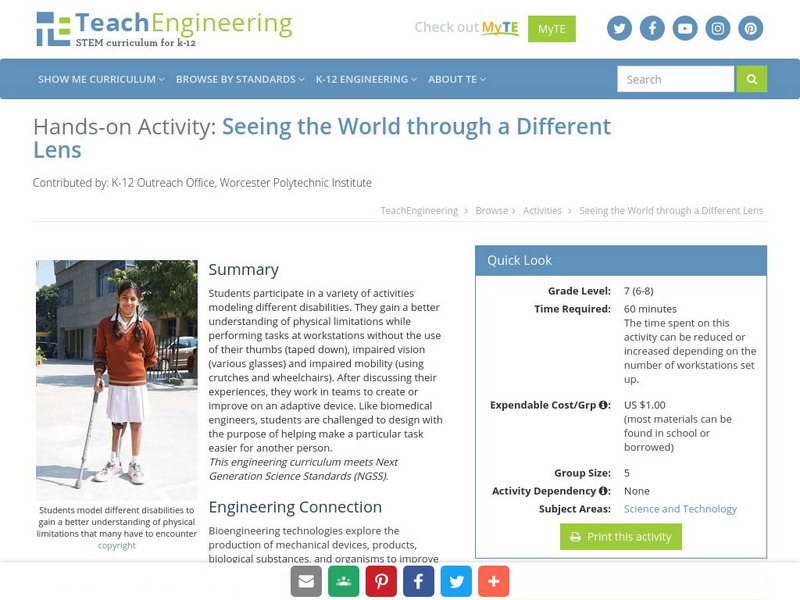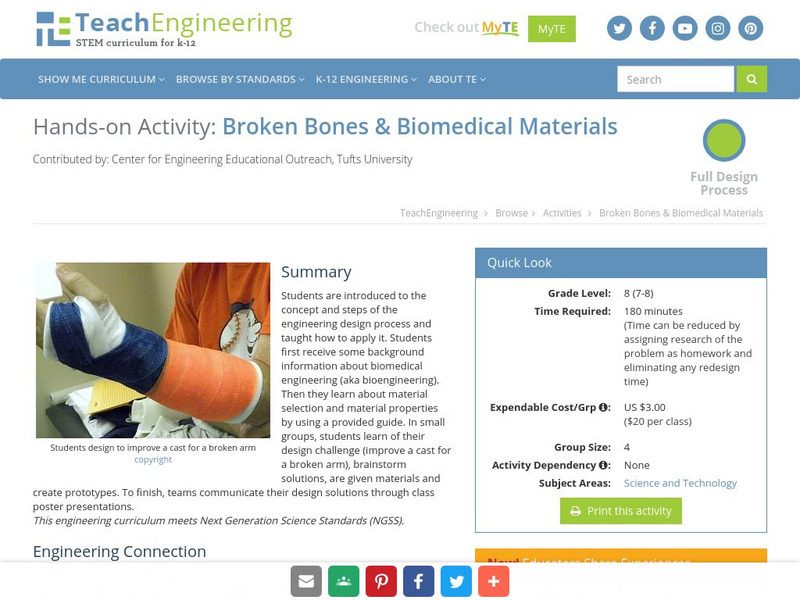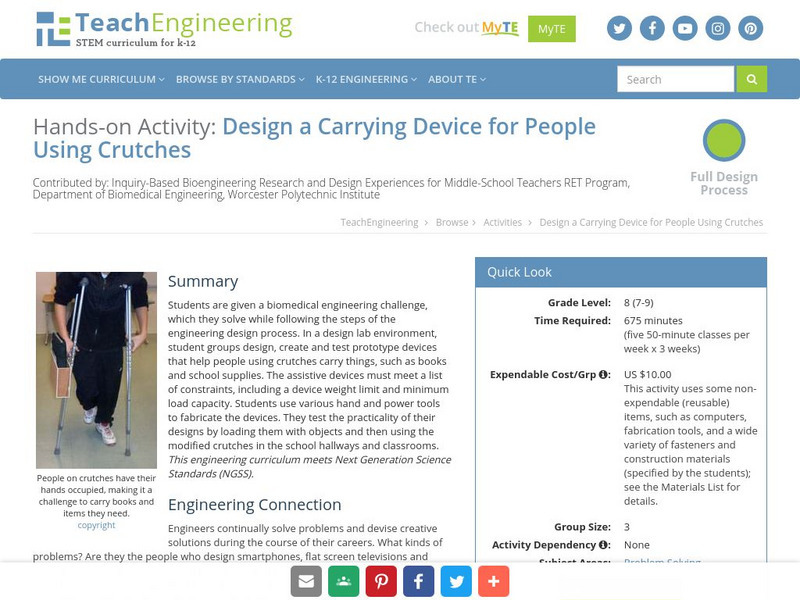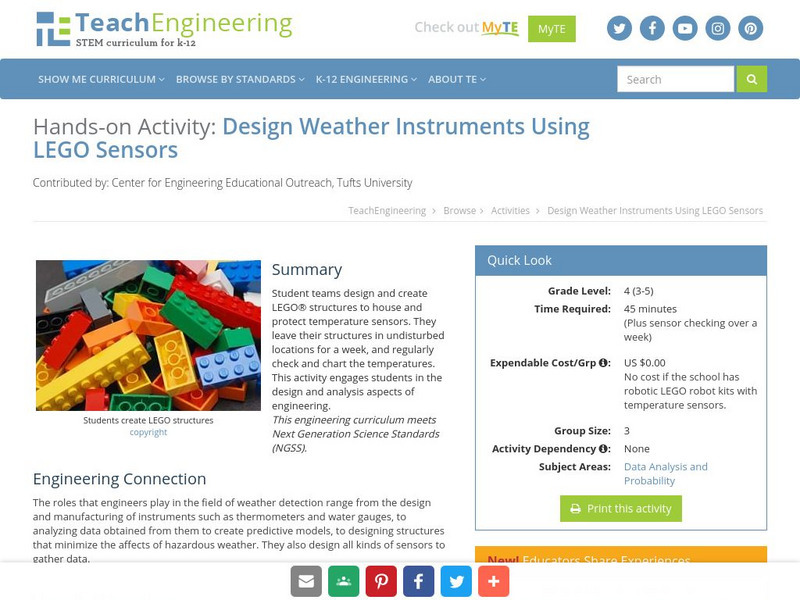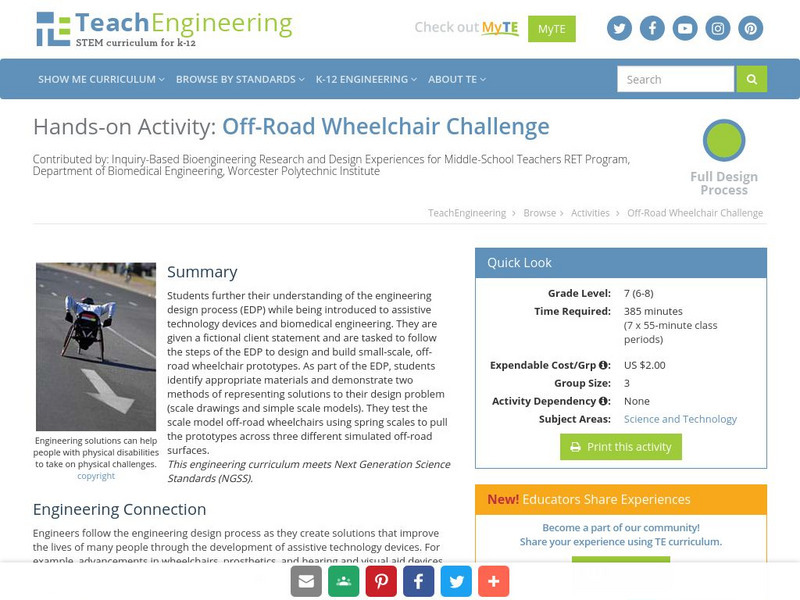TeachEngineering
Teach Engineering: Induced Emf in a Coil of Wire
Students use a simple set up consisting of a coil of wire and a magnet to visualize induced EMF. First, students move a coil of wire near a magnet and observe the voltage that results. They then experiment with moving the wire, magnet,...
TeachEngineering
Teach Engineering: Bubbles and Biosensors
Students learn that color swirls on the bubble surfaces are caused by refraction. Then they apply this theory to thin films in general, including porous films used in biosensors, listing factors that could change the color that become...
TeachEngineering
Teach Engineering: When Silicon Talks
In this activity, students tackle this aspect of engineering as they solve problems for precise angles and speeds, and predict data output when samples are altered.
TeachEngineering
Teach Engineering: Show Me the Genes
In this activity, students create posters which explain and illustrate thin film refraction and the factors that influence it. The goal is to explain the experimental results of using an optical biosensor, and prove these results with a...
TeachEngineering
Teach Engineering: Peripheral Vision Lab
Students explore their peripheral vision by reading large letters on index cards. Then they repeat the experiment while looking through camera lenses, first a lens with a smaller focal length and then a lens with a larger focal length....
TeachEngineering
Teach Engineering: Rgb to Hex Conversion
Students practice converting between RGB and hexadecimal (hex) formats. They learn about mixing primary colors in order to get the full spectrum of colors and how to average pixel values.
TeachEngineering
Teach Engineering: Putting It All Together: Peripheral Vision
In this culminating activity of the unit, students bring together everything they've learned in order to write the code to solve the Grand Challenge. The code solution takes two images captured by robots and combines them to create an...
TeachEngineering
Teach Engineering: What Is Going on With Grandma?
Students are introduced to the concepts of the challenge question. First independently, and then in small groups, they generate ideas for solving the grand challenge introduced in the associated lesson: Your grandmother has a fractured...
TeachEngineering
Teach Engineering: What Makes Our Bones Strong?
Students will use this activity to determine what keeps our bones strong. Soaking the bones in vinegar will remove the calcium from the bones causing them to become soft and rubbery. Students will find that when we age, calcium is...
TeachEngineering
Teach Engineering: Go Public: Osteoporosis Brochure
Students will answer the Challenge Question and use the acquired learning from Lesson 1, "Fix the Hip Challenge" and Lesson 2, "Skeletal System Overview"to construct an informative brochure addressing osteoporosis and the role biomedical...
TeachEngineering
Teach Engineering: The Mummified Troll: Devising a Protection Plan
Students are introduced to the parameters of an engineering challenge in which their principal has asked them to devise an invisible security system to cost-effectively protect a treasured mummified troll, while still allowing for...
TeachEngineering
Teach Engineering: Exploring Light: Absorb, Reflect, Transmit or Refract?
In a hands-on way, students explore light's properties of absorption, reflection, transmission and refraction through various experimental stations within the classroom. To understand absorption, reflection and transmission, they shine...
TeachEngineering
Teach Engineering: Lasers, Let's Find 'Em!
Students research particular types of lasers and find examples of how they are used in technology today. Teams present their findings by means of PowerPoint presentations, videos or brochures. The class takes notes on the presentations...
TeachEngineering
Teach Engineering: Construct It!
Students use simple household materials, such as PVC piping and compact mirrors, to construct models of laser-based security systems. The protected object (a "mummified troll" or another treasure of your choosing) is placed "on display"...
TeachEngineering
Teach Engineering: A House Is a House for Me
Students brainstorm and discuss the different types of materials used to build houses in various climates. Small models of houses are built and tested against different climates.
TeachEngineering
Teach Engineering: e.g. Benedict's Ambulance Patient Safety Challenge
Students are given a fictional client statement- the engineering challenge- and are directed to follow the steps of the EDP to design prototype patient safety systems for small-size model ambulances.
TeachEngineering
Teach Engineering: Seeing the World Through a Different Lens
Students will participate in a variety of activities modeling different disabilities. After discussing their experiences, students work in teams to devise or improve on an adaptive device.
TeachEngineering
Teach Engineering: Seeing the World Through a Different Lens
Students will participate in a variety of activities modeling different disabilities. After discussing their experiences, students work in teams to devise or improve on an adaptive device.
TeachEngineering
Teach Engineering: Broken Bones
The purpose of this activity is to introduce students to the concept of the engineering design process and to teach them how to apply it. In "Broken Bones," students will explore the steps of the engineering design process. They will...
TeachEngineering
Teach Engineering: Design a Carrying Device for People Using Crutches
Students are given a biomedical engineering challenge, which they solve while following the steps of the engineering design process. In a design lab environment, student groups design, create, and test prototype devices that help people...
TeachEngineering
Teach Engineering: Designing a Package That Works
The goal is for students to understand the basics of engineering associated with the packaging of items to preserve, market, and safely deliver products. The packaging for each type of use varies. While observing and thinking about all...
TeachEngineering
Teach Engineering: Design Weather Instruments Using Lego Sensors
Students will design and create a LEGO structure that will house and protect a temperature sensor. They will leave the structure in a safe spot and check the temperature regularly and chart it.
TeachEngineering
Teach Engineering: Super Slinger Engineering Challenge
Students are challenged to design, build and test small-scale launchers while they learn and follow the steps of the engineering design process. For the challenge, the "slingers" must be able to aim and launch Ping-Pong balls 20 feet...
TeachEngineering
Teach Engineering: Off Road Wheelchair Challenge
Students further their understanding of the engineering design process (EDP) while being introduced to assistive technology devices and biomedical engineering. They are given a fictional client statement and are tasked to follow the...
